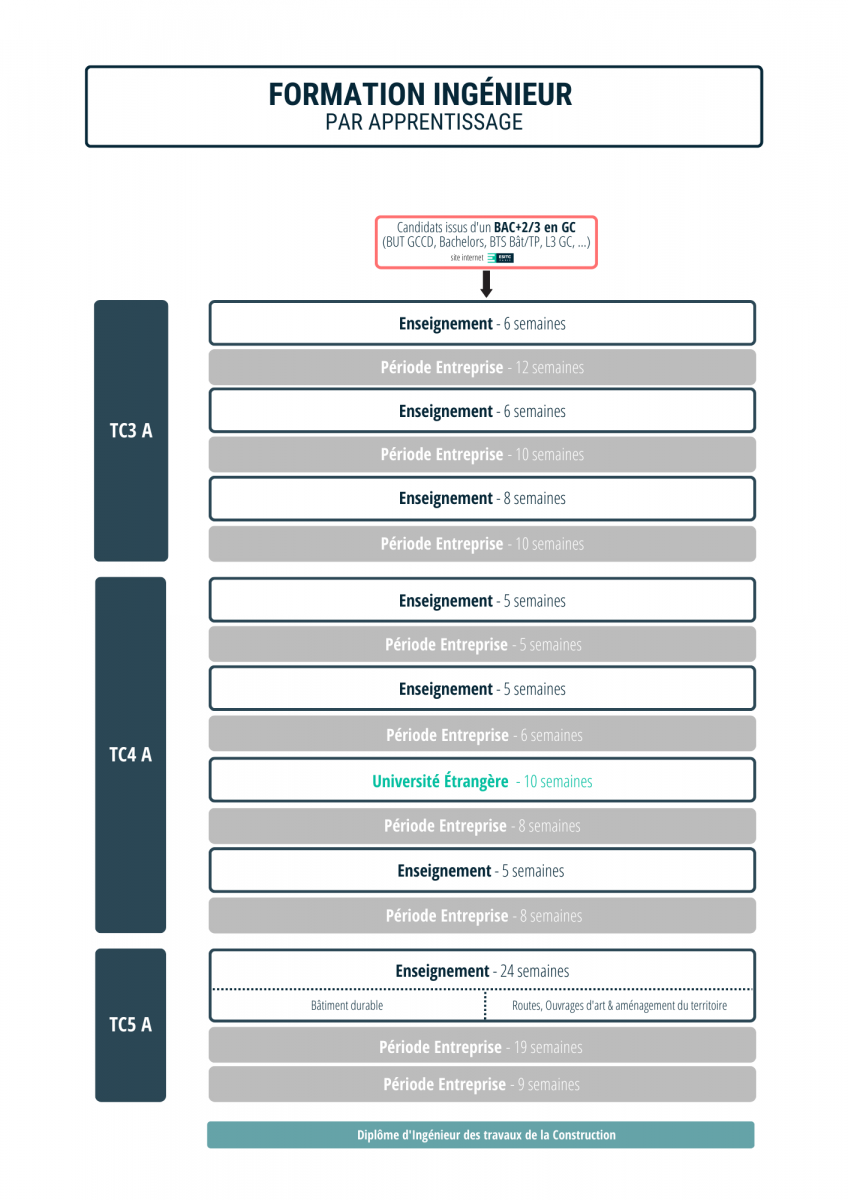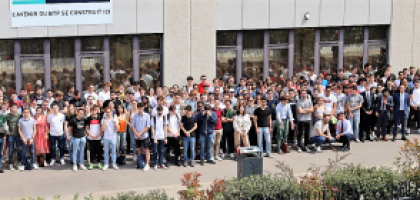
Since 2012, ESITC Paris has been offering a work-study programme under an apprenticeship contract. This course, which is only available on the engineering cycle, is financed by the host company
| Two campuses

Since the start of the new academic year in September 2022, ESITC Paris has been offering an apprenticeship programme on its new campus in Egletons. This programme complements the existing courses on site. The educational content is identical in every respect to that offered on the Arcueil campus
| Specific rhythm
The apprenticeship programme covers the entire engineering cycle. The 36-month course comprises 17 periods, 8 "school" periods (including one in a foreign university) and 9 "company" periods
The choice of option (or major) in Sustainable construction, engineering structures and regional planning depends on the company activities
Each year of the cycle includes two or three Teaching Units (TUs) devoted to scientific and technological subjects, one TU in expression and communication, including French, English and a second language (German, Italian or Spanish), and one TU devoted to making the most of experience gained in work-linked training or in management, accounting or law subjects.
During the first two years of the engineering cycle, and despite the different pace of their fellow students, the school puts in place modules and projects that are common to both students and apprentices. In the final year, the apprentice students join their fellow students from the student programme, depending on their major, for the last academic semester to complete the technical teaching and work on the cross-disciplinary end-of-studies project. The apprenticeship engineering cycle includes an international period at 2 foreign partner universities
Continuous assessment for better validation of prior learning
.
 Academic periods
Academic periods
Each year of the cycle includes two or three teaching units (U.E) devoted to scientific and technological subjects, one U.E. in expression and communication, including French, English and a second language (German, Italian or Spanish), and one U.E. devoted to making the most of experience gained through work experience or in management, accounting or law subjects
During the first two years of the engineering cycle, and despite the different pace of their fellow students, the school puts in place modules and projects that are common to both students and apprentices. In the final year, the apprentice students join their fellow students from the student programme, depending on their major, for the last academic semester to complete the technical teaching and work on the cross-disciplinary end-of-studies project
Continuous monitoring to better validate what you have learned
Each subject is the subject of one or more knowledge tests (compositions, applications, practical work, TDs) and/or projects carried out in groups of 2 or 3 people. In order to progress to the next class, the apprentice-engineer must achieve averages above the required minimums. If these minimum standards are not achieved, oral refresher examinations are organised in June or early September. Validation of prior learning is the responsibility of a jury chaired by a company executive and made up of the school's management and teachers
 Company periods
Company periods
Within their host company, each apprentice is monitored and supervised by an Apprenticeship Master as well as by a company tutor according to he topic studied for each period. These study themes must be addressed by the student-apprentice
In-company study topics
⇒ Works management
⇒ Management of subcontractors, suppliers and service providers
⇒ Business management
⇒ Design office (technical, methods, pricing, etc.)
⇒ Works management
⇒ TFE
⇒ 3 "non-theme" periods are spread over the 3 years of the cycle during the summer periods
Educational monitoring and assessment
During in-company periods, the student-apprentice is supervised by two people: his or her Apprentice Master and/or a company tutor (generally a senior works engineer) and an ESITC Paris educational tutor. Their roles are defined in the apprenticeship booklet. The skills acquired during each company period are validated during an on-site meeting between the school tutor, the apprentice engineer and the company tutor, and assessed by the company tutor and the school, which produces a written report and an oral presentation at the end of each company period







